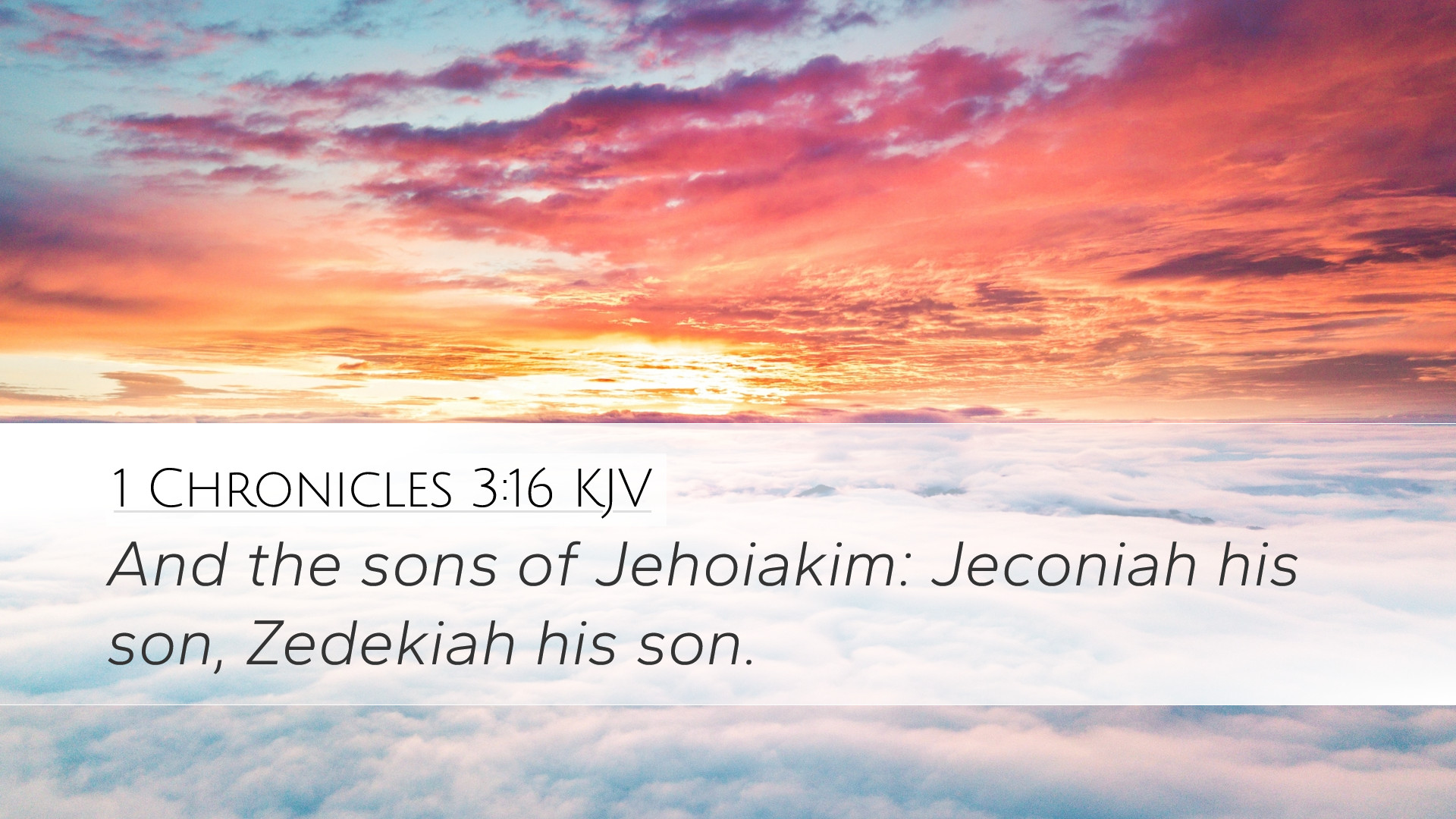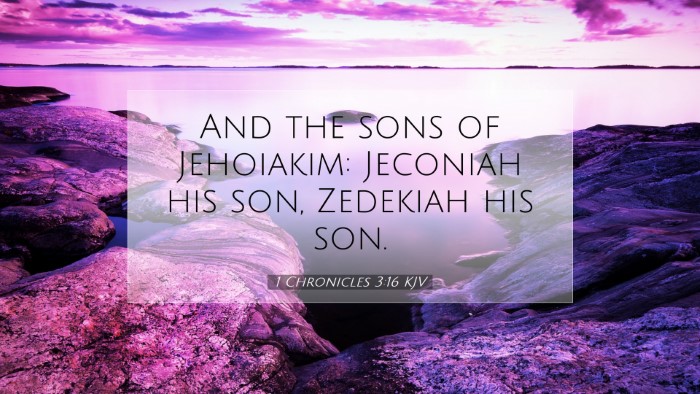Commentary on 1 Chronicles 3:16
Verse Context: 1 Chronicles 3:16 states, "The sons of Jehoiakim: Jeconiah his son, and Zedekiah his son." This verse is significant as it connects the lineage of David and highlights the historical implications of the Jewish monarchy.
Historical Significance
1 Chronicles serves as a record of genealogies leading to the restoration of God’s people after the Babylonian exile. The mention of Jehoiakim's sons, Jeconiah and Zedekiah, must be understood within the broader context of the Davidic covenant and its impact on Israel’s history.
-
Davidic Lineage: The verses preceding and following this provide a detailed genealogy of David’s descendants. Matthew Henry emphasizes the importance of these genealogies as affirmations of God's promises to David concerning his lineage and the perpetual kingdom.
-
Exile Implications: Albert Barnes notes that Jeconiah (or Coniah) was taken captive during the Babylonian exile, and his name is significant in understanding the interrupted nature of the Davidic line as it pertains to royal authority.
-
Restorative Purpose: The mention of Jehoiakim's sons also serves as a reminder of the restoration to come, as highlighted by Adam Clarke, encapsulating the hope of Israel that would culminate in Jesus Christ's lineage.
Exegetical Insights
This verse is concise yet contains profound theological implications. The names of Jeconiah and Zedekiah are critical to understanding the concept of kingship in Israel.
-
Jeconiah's Role: Often referred to in prophecy, Jeconiah represents the shift in power during the Babylonian captivity. Barnes comments on how his lineage is often seen as a contrast to the prophetic identity of Zedekiah, who represented failed leadership and rebellion against God.
-
Symbol of Hope: Zedekiah's eventual fate as the last king of Judah carries prophetic weight. Clarke discusses how Zedekiah symbolizes the accountability of leadership, illustrating that failure in upholding covenant faithfulness leads to national devastation and exile.
Theological Reflections
The genealogy in 1 Chronicles 3:16 like other genealogies in Scriptures, serves multiple purposes. Here we can reflect on both the divine sovereignty and the human responsibility residing in the unfolding stories of God's people.
-
God's Sovereignty: Matthew Henry asserts that God's providence in history ultimately leads to His redemptive plan found in Jesus Christ. The lineage is a testament to God's faithfulness to His word despite human failures.
-
Human Responsibility: The actions of Jehoiakim and his sons reflect the choices made by leaders and how these choices had profound implications for the people. Barnes explains how the royal lineage serves as a reminder of the accountability that comes with leadership.
Application for Today's Believers
In today's context, 1 Chronicles 3:16 offers rich insights for pastors, students, and theologians.
-
Leadership and Legacy: This text encourages leaders to reflect on their legacy and the impact of their leadership on future generations. Pastors can draw from the lessons of Jehoiakim and his sons to advocate for faithful stewardship in their communities.
-
Hope in Restoration: The genealogical line points to the ultimate hope found in Christ, encouraging believers to trust in God’s restorative plans amidst despair. Clarke's insights remind us that even in brokenness, God’s promises prevail.
-
A Call to Faithfulness: As discussed by Henry, the genealogical narratives call Christians to uphold their responsibilities with diligence, reminding all to be mindful of the impact of personal choices on communal faith journeys.
Conclusion
1 Chronicles 3:16 encapsulates the divine narrative of redemption through Israel’s history, laid out through the genealogy of kings. Reflecting upon the lives of Jeconiah and Zedekiah alongside the insights from Matthew Henry, Albert Barnes, and Adam Clarke, brings us to understand the depth of God's promise and our accountability as God’s people.


